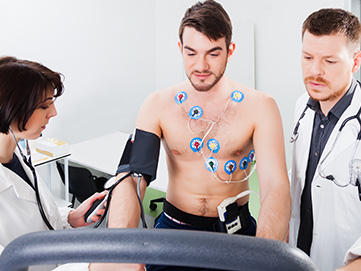Services »
Cardiac Imaging » Exercise Echocardiography stress test
General Overview

Exercise echocardiography stress test identifies how your heart muscles and arteries perform during physical exertion and helps in the diagnosis of coronary artery disease. The test is performed to detect the blockages in the arteries that carry oxygen-rich blood to the heart. During exercise, the heart requires a large amount of blood supply which may be hindered when there are blockages in the arteries. Exercise echocardiography stress test analyzes such blockages and the doctor suggests an appropriate treatment.
How It’s Done
The test usually takes 3-4 hours to complete. After noting down brief history, the technologist starts an IV line in the patient’s arm. Then baseline pictures of the heart are taken looking at the movement of heart walls. Then you undergo stress portion of the test where you walk on the treadmill. A second set of pictures are taken once the target heart rate is reached. The comparison of the two sets of images will determine the condition of blood flow to the heart.
What Methods are Used?
To determine whether your heart gets enough supply of blood at increased levels of activity, the following tests may prove to be useful:
- Treadmill stress test: This measures your heart rate and EKG changes while walking on a treadmill.
- Dobutamine or Persantine/Lexiscan Nuclear Stress Test: In this test, people who are unable to exercise, are injected with a drug called Dobutamine to increase the heart rate or persantine/lexiscan is used to mimic changes in the arteries around the heart similar to as if you were exercising.
- Stress echocardiogram (Exercise or Dobutamine): In this test, baseline echocardiogram is obtained to visualize the movements of heart walls. Then the patient exercises or gets dobutamine through the iv if he cannot exercise, then echocardiogram is repeated. The 2 sets of pictures are compared which helps in determining if there could be any blockages in the arteries around the heart.
Any Side Effects?
The possible side-effects of Stress Echocardiogram can be listed but not limited to:
- Chest pain
- Severely high blood pressure
- Irregular heartbeats
- Dizziness
- Nausea
- Extreme fatigue
- Heart attack (rare)
Next Steps
Generally, there is no special type of care following an exercise echocardiogram. However, the doctor may give additional or alternate instructions after the procedure, depending on the patient’s particular situation. Some of the common instructions given include:
- Eating a variety of heart healthy foods
- Exercising regularly as per the guidelines of the Cardiologist
- Avoiding smoking
Contact Us
Heart and Vascular clinic, has a team of professionals who excel in Exercise Echocardiography treatments. Please contact us at (302) 338-9444 for further discussion about our services.
 Exercise echocardiography stress test identifies how your heart muscles and arteries perform during physical exertion and helps in the diagnosis of coronary artery disease. The test is performed to detect the blockages in the arteries that carry oxygen-rich blood to the heart. During exercise, the heart requires a large amount of blood supply which may be hindered when there are blockages in the arteries. Exercise echocardiography stress test analyzes such blockages and the doctor suggests an appropriate treatment.
Exercise echocardiography stress test identifies how your heart muscles and arteries perform during physical exertion and helps in the diagnosis of coronary artery disease. The test is performed to detect the blockages in the arteries that carry oxygen-rich blood to the heart. During exercise, the heart requires a large amount of blood supply which may be hindered when there are blockages in the arteries. Exercise echocardiography stress test analyzes such blockages and the doctor suggests an appropriate treatment.
